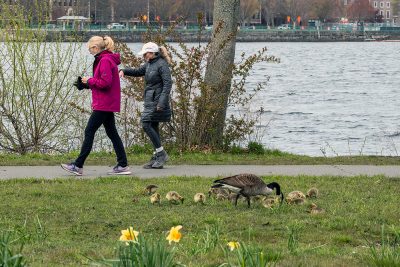College campuses across the nation have remained empty for months now as the coronavirus continues to jeopardize in-person classes, research facilities and collegiate life. This absence, however, has caused positive environmental impacts, Boston University scientists say.

The City of Boston, which has been under a statewide stay-at-home advisory since March 23, provides public transportation for about 1.18 million commuters each weekday. Now, fewer residents are relying on those services in the wake of business closures and health concerns.
Jeffrey Geddes, assistant professor in BU’s Earth and Environment department, wrote in an email that this decline in travel is evidenced by lower nitrogen dioxide emissions. NO2 is an air pollutant common in urban areas, given the high volume of car traffic that produces the toxin, but Geddes wrote that reduced transportation in Boston has significantly reduced NO2 output.
“A lot of people really did stop driving their cars to work, and stayed home instead,” Geddes wrote. “When we typically see the highest concentrations of NO2 in the early morning, this is no longer the case. Overall, the concentrations of NO2 in the atmosphere around Boston have probably declined by at least 50 [percent] relative to this time last year.”
Robert Buchwaldt, a research assistant professor in the Earth and Environment department said this decrease in NO2 levels, as well as that of carbon dioxide, could signal unintended improvements to the city and the world at large.
“Right now, we can see a decrease of CO2 in our atmosphere,” Buchwaldt said. “You just need to go outside, and the air smells actually better in Boston. You actually can smell the flowers and not just the exhaust pipes.”
But urban commuters, Buchwaldt said, are not the only reason the skies and the seas are clearing up.
“It’s not only the driving around. It’s the transportation, it’s the air travel, it’s the production is down,” Buchwaldt said. “It’s an extremely interesting time in regards to climate change right now.”
The current shift in the work experience and lifestyle of many during the pandemic could prevail after the virus itself ceases to become a threat. Jessica Wright, a PhD student with a focus on urban ecology and natural gas infrastructure, said commuters’ transportation habits might look quite different once people can return physically to work.
Geddes wrote he is hopeful of a potential decrease in cars on the road in the future should companies move to digital operations and allow more employees to work from home. If businesses become more flexible with commuting times, Geddes wrote, Boston’s atmosphere could improve.
“I also worry that this situation could backfire,” Geddes wrote. “For example, perhaps the pandemic will discourage people from taking public transit if they have the option to drive themselves.”
As Boston recovers from the pandemic, Wright said the City’s climate policy is due for revisions. She believes cities could take advantage of a slowed economy to work on environmental legislation to limit the use of fossil fuels.
“It’ll be interesting to see what cities really embrace this time to try to transform a bit of their energy and transportation policies to include cleaner fuels,” Wright said. “The commuter rail is a great way to really save on vehicle emissions, but I think taking the commuter rail is going to look drastically different after this, too.”
Once the pandemic ends, Geddes wrote, he hopes society will be more aware of how individual behaviors impact the environment.
“The price we are paying for clean air right now is extremely disruptive and painful, so that people might not see it as ‘worth it’ for the clean air, and I think that is a very fair reaction,” Geddes wrote. “I’m optimistic that this will drive some real action towards sustaining cleaner air over the long term.”






























































































































